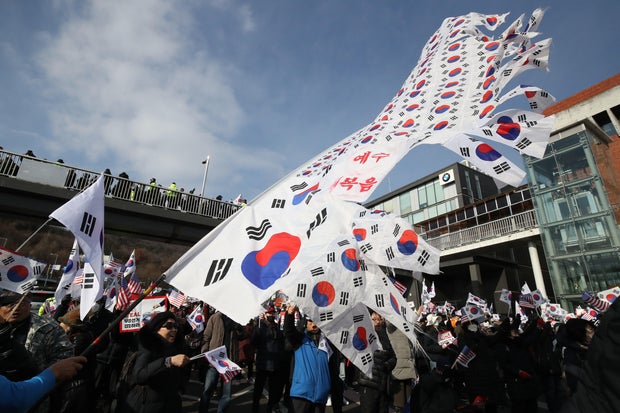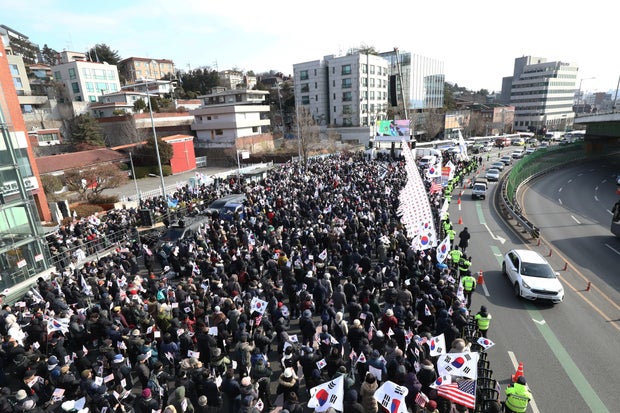Seoul, South Korea – South Korean investigators left the residence of ousted President Yoon Suk Yeol after a nearly six-hour standoff in which he resisted their attempt to detain him. It is the latest conflict in the political crisis that has paralyzed South Korean politics and it has become apparent two heads of state were charged under the moon.
The country’s anti-corruption agency said it withdrew its investigators after the president’s security forces prevented them from entering Yoon’s house for hours due to concerns about their safety.
JUNG YEON-JE / AFP via Getty Images
The organization said that several of its investigators had many conflicts with the president’s security forces and expressed “deep regret for the attitude of the suspect, who did not comply with the legal process.”
The National Police Agency said it plans to investigate the chief and deputy chiefs of the presidential security unit for allegedly interfering with police operations and called them for questioning on Saturday.
Yoon, a former prosecutor, has defied investigators’ efforts to question him for weeks. The last time he was known to have left his residence was on December 12, when he went to the nearby presidential office to make a statement on national television, making a defiant statement that he would fight against attempts to overthrow him.
Investigators from the country’s anti-corruption agency are investigating charges of treason after Yoon was frustrated that his goals were blocked by a parliament full of opposition parties. martial law was declared on December 3 and sent soldiers to surround the National Assembly.
Parliament rejected the announcement within hours by a unanimous vote and indicted Yoon on December 14, accusing him of treason, while South Korea’s anti-corruption authorities and public prosecutors opened separate investigations into the incidents.
A Seoul court issued an arrest warrant for Yoon on Tuesday, but enforcing it is difficult as long as he remains in his official residence.
Yoon’s lawyers, who challenged the warrant on Thursday, said it could not be used at his residence because of a law that protects places that may be connected to military secrets from being searched without a warrant.
The office said it would consider further steps, but did not immediately say whether it would make another attempt to arrest Yoon. The warrant for his arrest is valid for one week.
Yoon’s lawyers also said that the Office for Corruption Investigation of Senior Officials, which is leading the investigation in cooperation with police and military detectives, does not have the power to investigate cases of treason. They said the police had no legal authority to assist in Yoon’s arrest, and could face arrest by “the presidential security service or any citizens.” They did not elaborate on the claim.
If the investigators are able to detain Yoon, they will likely ask the court for permission to formally arrest him. Otherwise, you will be released after 48 hours.
Park Chan-dae, leader of the opposition Democratic Party, called the withdrawal of the anti-corruption agency regrettable and urged the agency to make another attempt to arrest Yoon on Friday.
Kwon Young-se, who heads the emergency leadership committee of Yoon’s conservative People Power Party, called the party’s efforts to arrest Yoon “unfair and highly inappropriate,” saying there was no risk of Yoon trying to flee or destroy evidence.
Thousands of police gathered at Yoon’s residence on Friday, forming a cordon around a growing group of pro-Yoon protesters who braved an hours-long standoff, waving South Korean and American flags while chanting slogans vowing to protect him. There were no immediate reports of major conflicts outside the residence.
Getty Images
Dozens of investigators and police were seen entering the gate of the Seoul residence to issue a warrant for Yoon’s arrest, but the dramatic situation quickly turned into a standoff. Two of Yoon’s lawyers, Yoon Kap-keun and Kim Hong-il, were seen entering the presidential palace gate during the day. At the moment it was not clear what the lawyers discussed with the president.
Sok Dong-hyeon, another lawyer on Yoon’s legal team, said the agency’s efforts to arrest Yoon were “reckless” and showed a “grotesque disregard for the law.”
Getty Images
South Korea’s Ministry of Defense confirmed that investigators and police passed through a military unit guarding the residence before reaching the building. The presidential security service, which controls the residence itself, declined to comment. South Korean television, YTN, reported a scuffle as investigators and police clashed with the president’s security.
As the standoff continues, Democrats have called on the country’s acting leader, Deputy Prime Minister Choi Sang-mok, to order the president’s security forces to stand down. Choi did not immediately comment on the situation.
“Don’t drag honest employees of the presidential security service and other government officials into the depths of crime,” said Jo Seung-lae, a Democratic Alliance lawmaker. Choi must “remember that quickly fixing the rebellion and preventing further chaos is your responsibility,” Jo said.
Yoon’s defense minister, police chief and several top military commanders have been jailed for their roles during martial law.
Yoon’s presidential powers have been suspended since the National Assembly voted to impeach him on December 14. Yoon’s fate now rests with the Constitutional Court, which has begun debating whether to support impeachment and formally remove Yoon from office or reinstate him. At least six judges of the nine-member Constitutional Court must vote to remove him from office.
The National Assembly voted last week to censure Prime Minister Han Duck-soo, who became acting president after Yoon’s impeachment, for his reluctance to fill three vacancies on the Constitutional Court before the court reviews Yoon’s case.
Facing mounting pressure, the new acting president, Choi, appointed two new judges on Tuesday, which could increase the chances of the court tolerating Yoon’s impeachment.


